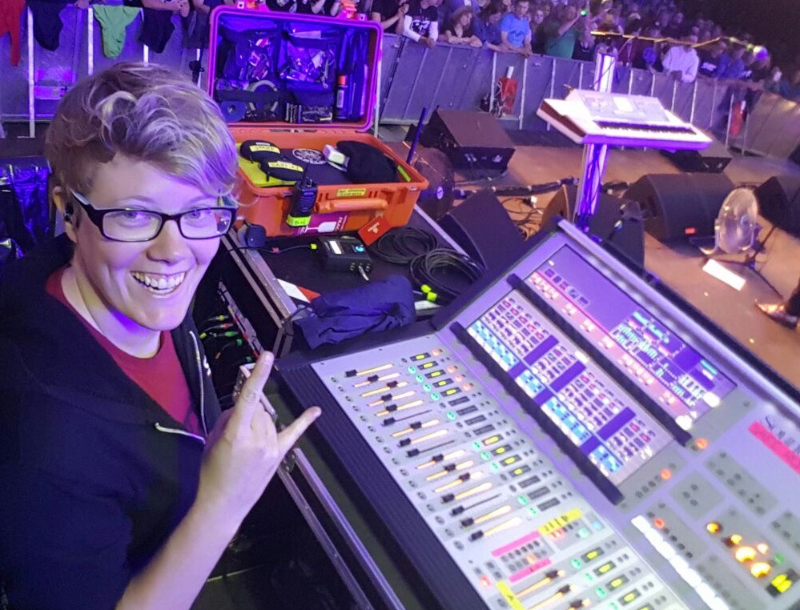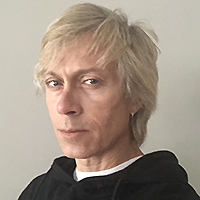Daniela Seggewiss is a bit of a rarity: someone who’s pretty much always known exactly that she wanted to work on stage in the live concert industry. “I caught the bug when I was 13, at my first show. I saw people running around the stage dressed in black and I was like, ‘That’s it. That’s what I want to do.’ Even though I had no idea what they were doing or what the job was,” she adds, laughing.”
She soon found out, however, taking her first steps toward her future career by seeing as many shows as possible and connecting with audio engineers who’d take the time to speak with her. But it was that first gig; a one-day ‘70s rock festival featuring bands including The Sweet – a band she would begin mixing monitors for in 2014 and a role she continues to hold to this day – that set the hook.
Seggewiss feels lucky the engineers and crew members she met early on at shows in her hometown in Germany were willing to take the time to answer her questions. “I probably got on their nerves, going ‘What does that do? How does that work?’ But they allowed me to watch them, so I spent a lot of time as a teenager just observing what people were doing.” She also developed relationships that would pay dividends down the road, she says, adding that one of the monitor engineers she met early on gave her a job a decade later when she relocated to her current home base in Leeds, UK.
Those experiences have led her to take every opportunity to mentor and encourage others just starting out, she continues: “I’ve done lectures at my old Uni and I’m always open to speaking with others about my work. When I started, I felt there was a huge gap between me and someone at the next level, but when I started talking to that person, I realized they were only one step further. I feel like we need to spread the word that there are many different ways you can go in a career in music.”
She also maintains that’s a great means of grasping new concepts and skills. “Whoever I talk to – whether that’s somebody who’s been working in this industry for years or is completely new but has fresh eyes on a topic, genre, or whatever – I can learn something from them.”

The Right Combination
Seggewiss played piano and drums as a child but never had a desire to be a musician. “Maybe because I never liked to be in the spotlight,” she says, “but I liked technology and figuring out how things work, and audio is a combination of those things.”
Growing up in a small German town there were no real opportunities to work in live sound, but after finishing her A-Levels (high school) she landed an apprenticeship as an events technician at Westdeutscher Rundfunk (WDR), Germany’s national broadcasting station, in 2009.
Although it wasn’t the live gig she wanted, it allowed her to learn more about audio and all aspects of production. “It also provided me with a lot of time to figure stuff out. In an events company doing live gigs you just have to get the job done. At the station, when there was time, I could just play with different equipment. I think that gave me a really good set of tools. And it was also a gentle way to tell my parents that this is what I wanted to do,” she notes, laughing.
She continued with the broadcaster for a year following her apprenticeship, working in the audio department and handling live sound for WDR events in Cologne, often as an audio tech for the station’s orchestral ensembles and big bands.
Ultimately, Seggewiss decided to continue her education in audio in a formal setting. “I’m very aware that a degree isn’t something you necessarily need to do live sound, but in Germany people really like their certificates. They’re very much about that piece of paper that says you can actually do what you do.” At the time the programs she found in Germany focused more on theory than practice, however, and she was determined to find a hands-on course of study. Consequently, she expanded her search to the UK.
The first school Seggewiss heard back from was Leeds Beckett University, which offered her a spot in its Music Technology program. “I had a look at the city and liked it, and as I said, the engineers I’d met when I was younger were all from the UK, and one of the techs I knew actually lived in Leeds. And I thought, ‘Well if they remember me, that’s one contact already’.”
Once in Leeds, things came together quickly. “That engineer literally got me a job within a week of me moving here, which I would never have imagined happening,” she notes, continuing that it was a house gig at a small club called the Cockpit, a venue she’s described in the past as, “like mixing in a tin can” – a leaky tin can that also suffered regular power outages.
Built into the arches beneath a train bridge, with tin-cladding on the ceilings and an upstairs room in which she could touch the ceiling from a standing position. “It’s one of those small, iconic venues that’s on every circuit; a room that’s really hard work to mix, but where everybody plays.” In short, the perfect setting to get the hands-on experience she craved.
“Often I was the only engineer and it was kind of about making everything just sound reasonably good. I spent a year and a half there mixing everything that came through; definitely a great way to learn.”
It’s also where she developed the outlook and approach that’s served her well ever since. As she puts it, “It’s everybody’s job on a tour to make the best out of any situation.”

Making It Happen
During and after her studies at Leeds Becket, Seggewiss freelanced, mixing in various venues around Leeds, as well as the Bingley Music Live; a multi-day, outdoor 15,000 capacity festival where she worked her way up becoming the event’s main stage monitor engineer. “I kind of fell into doing monitors,” she explains, “but I’m quite good at staying calm and just letting artists do whatever they need to do. In my mind, we’re all there to make the gig happen, so I always try to have a smile on my face, be easy to work with, and easy to be around.
“It’s about putting myself into the musician’s shoes,” she continues. “There’s a lot of pressure on them on that stage and because the pressure is so high that it needs to go somewhere.”
Consequently, when emotions ramp up on stage, she doesn’t take it personally. “I’ve actually introduced myself to bands on festivals by saying, hello, I’m your punching bag for the day,” she adds with a chuckle. “But regardless of what the situation is, my number one goal is to create a comfort zone on stage.” Her approach to doing so is perhaps best summed up on her CV, where she describes herself briefly but thoroughly, with the words: ‘Sound Woman. Passionate and German – a very efficient combination.’















